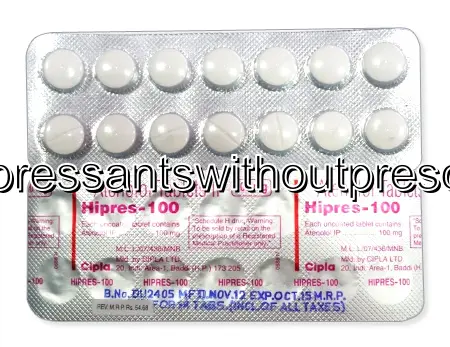| Package | Dosage | Price | Price per Dose | |
|---|---|---|---|---|
| Dosage: 25mg | ||||
| 350 pill | 25mg | €210.90 | €0.60 | |
| 140 pill | 25mg | €95.86 | €0.68 | |
| 84 pill | 25mg | €60.25 | €0.73 | |
| 56 pill | 25mg | €42.44 | €0.75 | |
| 28 pill | 25mg | €24.64 | €0.86 | |
| 14 pill | 25mg | €12.31 | €0.92 | |
| Dosage: 50mg | ||||
| 350 pill | 50mg | €249.25 | €0.71 | |
| 140 pill | 50mg | €105.44 | €0.75 | |
| 98 pill | 50mg | €79.42 | €0.82 | |
| 84 pill | 50mg | €75.31 | €0.89 | |
| 56 pill | 50mg | €47.92 | €0.86 | |
| 28 pill | 50mg | €28.75 | €1.03 | |
| 14 pill | 50mg | €15.05 | €1.10 | |
| Dosage: 100mg | ||||
| 350 pill | 100mg | €245.14 | €0.70 | |
| 140 pill | 100mg | €120.51 | €0.86 | |
| 84 pill | 100mg | €87.64 | €1.04 | |
| 56 pill | 100mg | €62.99 | €1.12 | |
| 28 pill | 100mg | €32.86 | €1.19 | |
| 14 pill | 100mg | €17.79 | €1.23 | |

Atenolol Description
Understanding Atenolol
Atenolol is a medication primarily used to treat cardiovascular conditions. As a selective beta-blocker, it works by blocking the effects of adrenaline on the heart and blood vessels. This action helps to reduce heart rate, decrease blood pressure, and ease the workload on the heart. Due to these effects, atenolol is commonly prescribed for conditions such as hypertension, angina pectoris, and sometimes for preventing heart attacks.
How It Works in the Body
The medication targets beta-1 adrenergic receptors found mainly in the heart. By selectively blocking these receptors, atenolol prevents the adrenaline from inducing rapid heartbeats or constriction of blood vessels. This leads to a more stable heart rhythm and can help prevent episodes of chest pain, known as angina. Additionally, lowering blood pressure reduces the risk of stroke and other serious complications. Atenolol's specificity for beta-1 receptors means it has fewer effects on the lungs compared to non-selective beta-blockers, making it suitable for some patients with respiratory issues.
Possible Benefits and Uses
Many patients experience significant benefits from taking atenolol as part of their treatment plan. It is effective in controlling blood pressure over long periods, which can prevent strokes, heart attacks, and kidney problems associated with high blood pressure. For those with angina, atenolol helps to reduce episodes of chest pain and improves quality of life. In some cases, it is used post-myocardial infarction to improve survival rates. Also, its calming effect on the heart can be advantageous for patients with certain arrhythmias.
Side Effects and Precautions
While atenolol is generally safe when prescribed properly, it can cause side effects. Common ones include tiredness, dizziness, cold extremities, and sometimes gastrointestinal discomfort. Because it lowers heart rate and blood pressure, monitoring is necessary to avoid excessive bradycardia or hypotension. Patients with asthma or other respiratory issues should use atenolol cautiously, as even selective beta-1 blockers can sometimes affect lung function. It is essential to inform your healthcare provider about any other medications being taken, as interactions may occur, especially with other blood pressure drugs or heart medications.
Consultation and Usage Guidelines
Proper use of atenolol involves adherence to the prescribed dosage and schedule. It is usually taken once daily, with or without food, as directed by a healthcare professional. Never adjust the dose or discontinue the medication abruptly without medical advice, as this can cause rebound effects or worsening of the condition. Regular check-ups are important to monitor blood pressure, heart rate, and overall health. Additionally, patients should inform their doctor if they experience unusual symptoms such as severe fatigue, shortness of breath, or signs of allergic reactions.
